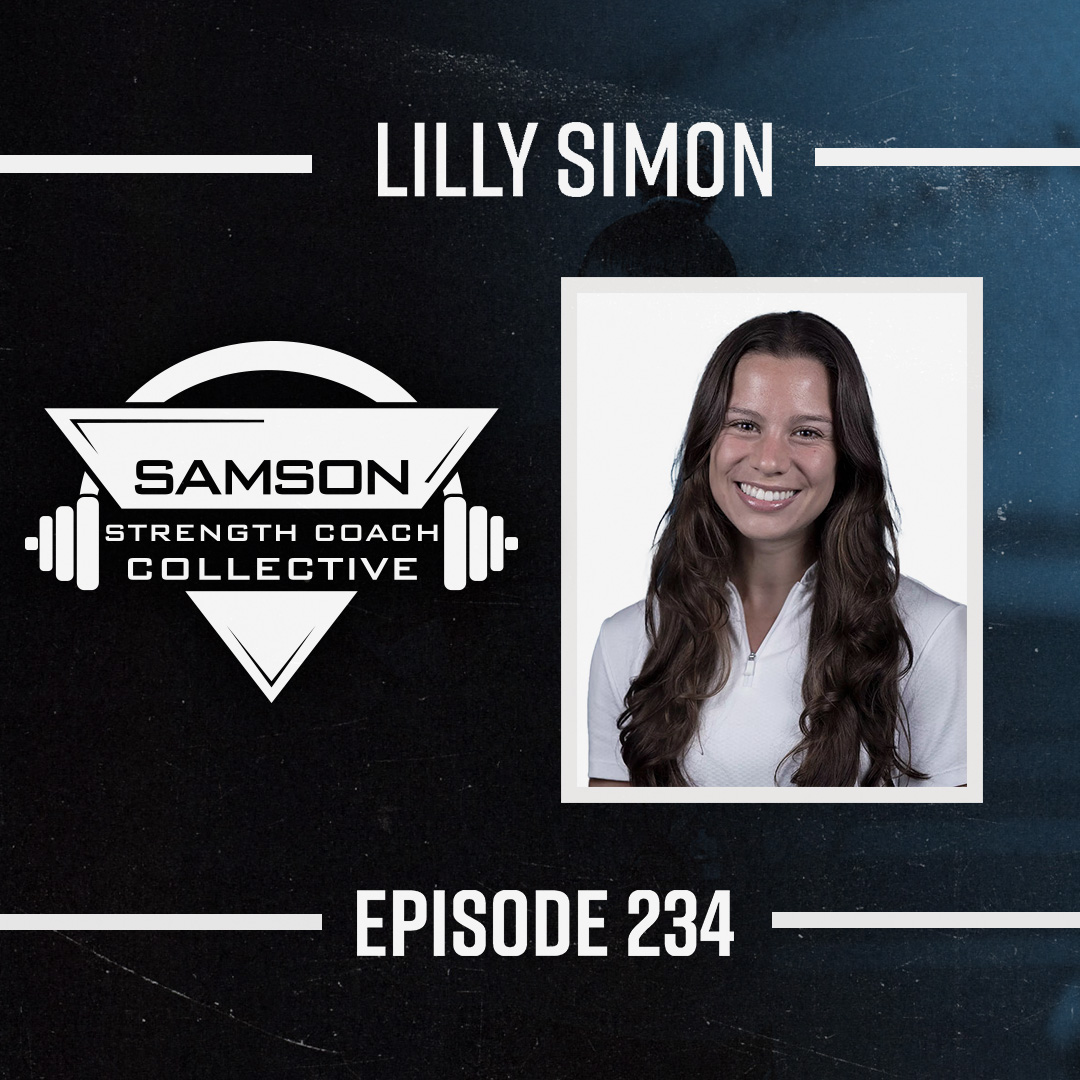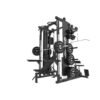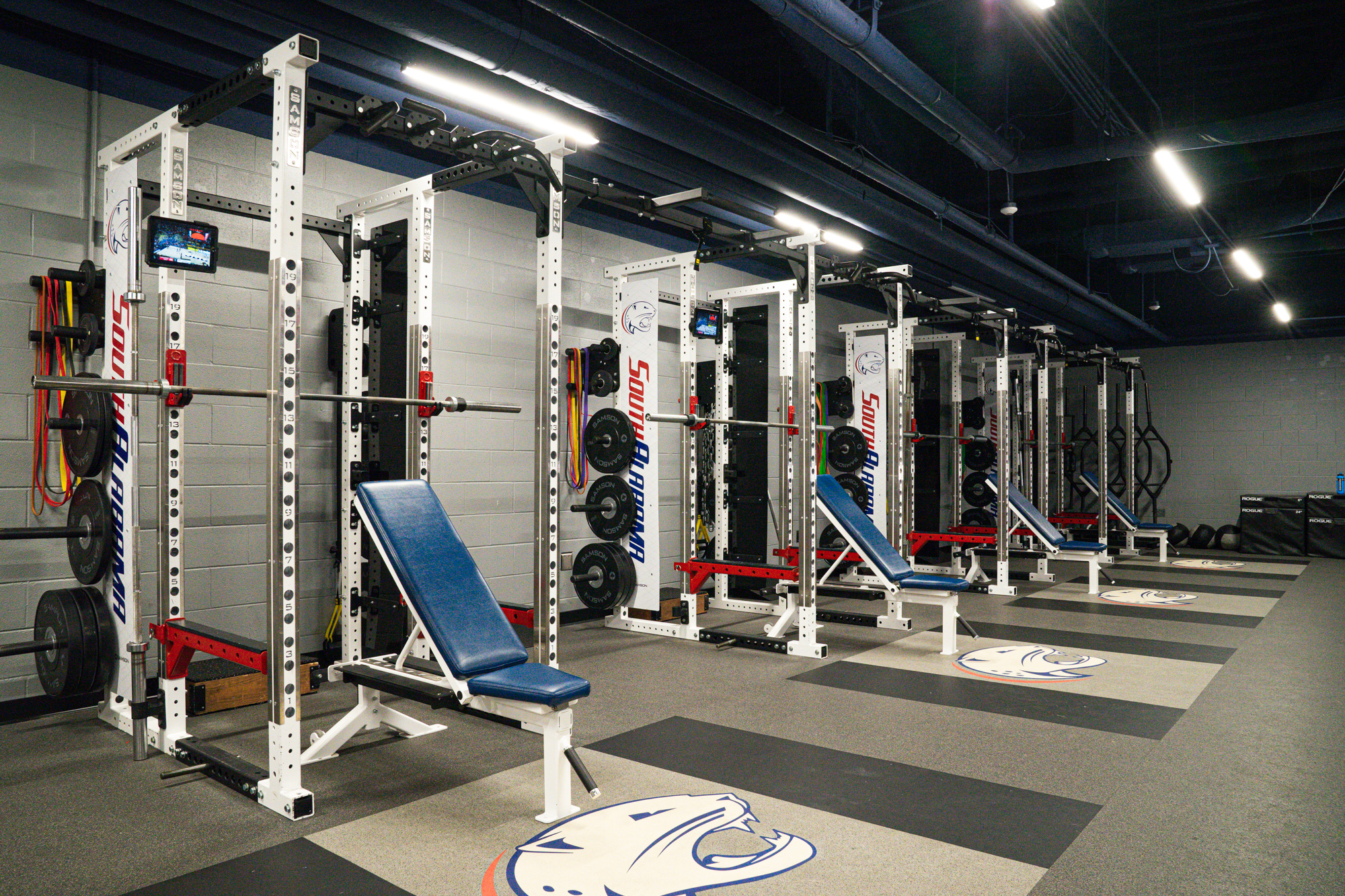In this episode, Lilly Simon of the University of North Carolina dives into “The Illusion of Choice”—the idea that small, seemingly simple decisions can shape the direction of a coaching career. Drawing on her journey from lacrosse athlete to strength coach, Lilly explains how taking initiative, reflecting on personal values, and making intentional choices have positioned her for early success in the field. Her insights highlight how meaningful career growth often stems from the smallest moments of alignment.
Key Takeaways
- Small decisions can significantly impact your career trajectory.
- Evaluating decisions through the lens of your values is essential.
- Aligning goals with values strengthens long-term decision-making.
- Reflection provides clarity for shaping future choices.
- Career development is built through consistent, small actions.
- Knowing your values helps guide your professional path.
- Success is often the result of many small, intentional choices.
- Intentional decision-making fosters fulfillment and growth.
- Values-aligned career paths lead to greater satisfaction.
- Continuous reevaluation of goals is key to development.
Quote
“Just how impactful small decisions can be… evaluating how choices align with my values and goals has put me in the position I am today.” — Lilly Simon
Spotify • YouTube • Apple Podcast
Never Miss An Episode Join Our Newsletter
Lilly Bernardi:
I think one of the biggest things that I have recently been thinking about is just how impactful small decisions can be. And I would say like over the course of my career, things that I think that I have done well that have put me in a position to be where I am currently, like I’m only in my.
fifth year full time as a strength conditioning coach. think things that I’ve done well were just taking initiative and also looking at decisions and kind of evaluating, okay, how does this align with my values and how does this align with my goals? Even if I didn’t know I was doing it at the time.
Samson:
What’s going on, Sampson Strength Coach Collective listeners? On today’s episode, we have Lily Simon, newly Lily Simon, formerly Lily Bernardi. She’s the Assistant Director of Sports Performance at University of North Carolina, Chapel Hill. Lily, thank you so much for coming on.
Lilly Bernardi:
Thanks so much for having me, I’m excited.
Samson:
Well, I’m very excited too. I mean, the first thing I want to talk to you about was how was the wedding?
Lilly Bernardi:
Best day of my entire life. It was amazing.
Samson:
That’s awesome.
What did you guys do signature cocktails? What was yours?
Lilly Bernardi:
We did, yes.
Mine was a spicy pineapple margarita.
Samson:
Damn, that sounds fantastic. And then what was your husband’s?
Lilly Bernardi:
Yes, yes.
He did an old fashioned, yeah.
Samson:
Yeah, of course.
Absolutely. Yeah. We had, we modeled, my wife and I modeled our cocktails after our dogs. So we had the, the Finley and the Fiona. Mine was an Irish meal and everybody liked mine way more. So I kind of hold that over my wife’s head just a little bit. So when are you guys planning on doing the honeymoon?
Lilly Bernardi:
Ha
We’re going in December, so about two weeks or so.
Samson:
Let’s go, that’s awesome. Well, that will also be, I always tell people the wedding day was like the best day of my life. And then the honeymoon was the best week of my life. Cause you just got to just hang out and have a ton of fun afterwards. So that’s awesome. Well, congratulations on the wedding. Can you just give us a background of your career and just kind of fill us in on what your background is and then what you’re currently doing.
Lilly Bernardi:
Mm-hmm.
Yeah, absolutely. how I got into strain conditioning, I was a college lacrosse player at the College of New Jersey. And I always like to say that I was not the stats person. I got a good bit of playing time, but if you looked back and saw that I was a, let’s say, three year starter, you wouldn’t be impressed with what you saw in the stats. But really where I…
shined on the team was in the weight room through my leadership. ⁓ And I really found myself and a lot of my confidence in I think what made me a good leader and teammate on the field in the weight room. And I attribute a lot of why I loved lacrosse so much to that. So ⁓ it was there that I was already an exercise science major, kind of went in and out of what I really wanted to do. And then one day it just hit me in the face. I was like,
why not just strength and conditioning? I love the weight room. And so I did my first internship at the Lawrenceville school, which is a high school in New Jersey. And then from there, the coaches recommended that I go to graduate school. So I applied to Hofstra University and a few other places and I ended up at Hofstra University. ⁓ My first full-time job followed that at Fordham University.
And then I was called back to Hofstra when they had some full-time openings. So I was there for two years. And now I am just starting my second year at UNC Chapel Hill.
Samson:
That’s awesome. TCNJ, I have not heard of that school in a long time. Thank you for bringing that back for me. yeah, well went to Temple University, so I’m very familiar with that area. Especially, I mean, the rest of the schools you just mentioned as well too. I Hofstra, I actually toured Hofstra as one of my undergrad schools to possibly look at. So, okay, so I mean, ultimately you mentioned the leadership aspect. Like what stood out to you about…
Lilly Bernardi:
Hey, I’m glad you’ve heard of it at all. Okay. Yep.
Mm-hmm.
Samson:
One, being able to lead and then what do you see as some of your strengths in leadership? Like what are the things that you look for in the white room that you can see from leaders?
Lilly Bernardi:
Yeah. I mean, I think that I’m a vocal person, but I would say even going towards my coaching style, I’m a very encouraging person. ⁓ so I am a voice that I feel like was a presence out on the field or in the weight room, whether it was coaching or as a player. But I think a lot of what I did as an athlete was I led by example and not everyone on my team loved the weight room, but.
For me, as a defender, it was the first place that I felt like I was seeing stats, right? So like, I don’t always show up in the stat book for doing the right thing behind the scenes. Unless it’s a cause turnover, there aren’t really stats for good defense. Ground ball, cause turnover, that’s really all there is. So as an athlete, I didn’t really see that. But then when I showed up and put my head down and I worked hard in the weight room, semester…
start to the end of the semester, I was seeing those stats in my numbers. I was seeing myself get stronger. And I think with that, just call it placebo effect or not, but like I felt like a stronger, more prepared athlete out on the field. And I think because I knew I was working hard, I had the ability to maybe call teammates out if I felt that they weren’t putting that effort in or.
⁓ if we’re rerunning a rep because somebody started early or somebody ended their plank early, I knew it wasn’t me, but I shouldn’t be working harder than you now on this extra rep because I didn’t do it wrong. So, I think trying to pull that out from others was something that was a strength of mine. And I think that because I led by example, I had the buy-in from my teammates to be able to say those things or call them out on those things.
Samson:
Yeah, think ⁓ somebody just mentioned recently on one of the podcasts we had that, know, strength and conditioning is kind of a very behind the scenes position as well. I think we’re all familiar with that, but I think it really translates well to your position in lacrosse, right? There’s not a lot of stats. There’s not a lot of glory. ⁓ What is it? Defense wins games, offense sells tickets, right? At the end of the day, it’s not going to be the most ⁓ glory filled position. Same with strength and conditioning. So I love that you were able to lead by example and kind of help drive the culture of the weight room.
How do you try to trickle that down to your athletes? What are the things that you focus on with them to help them be able to see that standard and help them grow it?
Lilly Bernardi:
I honestly think like setting the standard right off the bat. Like I said, I am a vocal presence in the weight room, but I’m not yelling and screaming, calling people out for what they’re doing wrong. I’m a very encouraging voice. And I’d like to say that I very rarely have to change my tone with my teams. But I think that being very straightforward from the beginning of this is my expectation. These are the standards when we’re here, you know, whether it’s
This is how we’re dressing. You guys are supposed to wear your lifting shoes when you come in here. If you’re not, I’m going to treat it as if you were late or unprepared for the team lift. Those things I am very direct about and I’m very straightforward. And it’s really only when those expectations aren’t being met that my tone will change. And it happens very rarely, but when it does happen, I think it kind of catches the attention of my athletes. ⁓
I would say maybe even more effective and they’re just like, ⁓ she’s mad. Like we screwed up because it rarely happens, but ⁓ attitude, effort, things like that, ⁓ those mean a lot to me. And I think it’s just because we can go into the whole story of how my athletic career ended. But ⁓ I just think there are so many people that would do anything to trade positions for one day with some of these athletes and how
lucky they are to be in the position that they’re in. something that drives me crazy is when people take it for granted.
Samson:
Yeah, that perspective’s huge. I think it’s hard to kind of remind yourself on a daily basis and that’s honestly a large role that strength and conditioning coaches play. I mean, you mentioned how your career ended. Do mind talking about it?
Lilly Bernardi:
Yeah, I was a COVID senior. So 2020, I was at TCNJ. If you’re familiar, it is really designed to just be an undergraduate program. There aren’t very many master’s degrees. So really taking a fifth year or being able to take on my year of eligibility that I was rewarded, it wasn’t really an option. I could have maybe done it elsewhere, but I think eventually I was met with the decision of
Samson:
Mmm.
Lilly Bernardi:
career or play lacrosse for another year. And I chose to dive into my career, but there’s a huge part of me that, you I’d love to get out there for one day. It doesn’t matter the sport. I would just love to be an athlete and be in that competitive nature. And it’s almost like that idea of unfinished business. And that’s something that I tried to bring into my coaching and a perspective that
I’ve told my athletes, you said, you you tell the same stories over and over. I tell that same story every year of like where I’m coming from and why these are my standards, why these are my expectations and why it bothers me when they’re not met.
Samson:
How do you think the athletes respond to that? Because I think that’s pretty powerful and can relate to them really well.
Lilly Bernardi:
Yeah, I mean, I think they’re receptive to it. The more and more we get removed from COVID. This is like the first year I’ve ever felt old as a coach. Like I’m not that far removed, but when I look at my freshman now, it’s almost like a 10 year age gap. And that’s the first time that it has hit me. But ⁓ I do think even still, a lot of our athletes had been impacted by COVID in their athletic careers, whether it was high school, college, whatever it is. ⁓
I think they respect that and they can understand.
Samson:
Yeah, just trust me. When you start making references to like TV shows that you watch when you’re younger and they have absolutely no clue what you’re talking about, it really starts to make you feel a lot older. So, well, I mean, again, I think that’s a pretty powerful message. know, do you, I mean, is the main thing that you get from that is you just try to preach that every day is valuable and you really need to give your all every single day. And if that’s the case, then how do you kind of catch the athletes when you see that they’re not doing that?
Lilly Bernardi:
Mm-hmm.
Mm-hmm. Yeah, that’s definitely my overall message, but I’m also very straightforward and transparent with them of I know that you’re not going to come in every day and feel your best. So I’m not expecting like 100 % your best every day, but if you can walk in here and you can be at 80 % and that’s our upper limit today.
I want you to give it that 80%. Like that is what I’m looking for. I understand that performance wise, maybe not every single day is going to be the same, but if I’m looking at the group, I can tell who is trying hard in a sprint and who is not. Who is actually picking their feet up off the ground and who is not. ⁓ I generally, like, I think a lot of times I take the team approach a little bit more and I’ll start off.
by saying, guys, like. ⁓
you can’t tell me that that was full effort on your sprint. And I’ll try to nip it in the bud and just address the team because I think sometimes it depends on the individual, but sometimes it’s kind of triggering for an individual to just be called out in front of the entire team. I know that not all of my athletes respond very well to that. So I try to take a more generalized approach. ⁓ I like when my athletes also take accountability and
they call each other out. I want like my athletes to be mini coaches out on the field. ⁓ you know, I think I take that approach and then if I need to have a conversation or I need to call out an individual, I’ll do that.
Samson:
Yeah, and I think that’s really, it’s a valuable tool and it’s a valuable skill for strength coaches to have. You know, one of the things that I see with a lot of interns that I have now are younger strength coaches that they’re a little bit scared for that accountability piece, right? And I mean, I was when I first started out too, I felt like if I even corrected somebody’s form, they’d hate me and never want to talk to me again. When I first started working in football and obviously that’s not the case, you know, what would your advice be to those coaches who kind of struggle with delivering accountability and are a little bit nervous about the after effects of it?
Lilly Bernardi:
Yeah, I mean, that’s it’s a great question. I think there’s so many different ways to go about it. And I think you have to lead with the relationships that you have with your teams. And I think that it’s really, really important to get to know your athletes well enough to know who responds well to what. So. ⁓
I’d say mid set if I have a team or an athlete who is squatting and I am seeing something, I try to be as concise. I’m trying to use one or two words that they can understand throughout their set so that hopefully they can real time be making those adjustments or making changes. And you can kind of tell when an athlete is understanding what you’re saying or cueing and an athlete who isn’t understanding. So that takes practice, that takes a ton of reps. So I think for ⁓
the younger coaches coach. Like that is what I would say first. If you see something, you could be wrong. could like trust your coaching eye and trust that what you’re seeing is correct. And then. ⁓
you might just have to kind of tailor how you’re going to cue things in the future. And also you’re never going to get to a point where you find the perfect coaching cue that’s going to work on everyone. Some people might not understand the words you’re using or the language you’re using. And then sometimes you kind of get that aha moment with an athlete and it’s just like, okay, well that’s another tool I could put in my toolbox on how to explain this to someone. ⁓ But I think if you are
coaching or cueing mid-set and it’s not clicking, pulling an athlete aside after the fact, having that conversation, maybe giving them a demo, talking them through it, walking them through it. I think that can be helpful as well. So when in doubt, just always coach, but it might not go perfectly the first time that you try and it takes a lot of practice.
Samson:
Yeah, absolutely. And I really appreciate that you bring in the trust aspect of it too, because I think a lot of times when people struggle to kind of deliver the accountability piece, they know that something may be incorrect, whether it’s a technique or whether it’s a behavior like showing up late to lift, like, or just showing up like right on time at like lift at 12, it’s 12 and 59 seconds, right? And so ultimately, like, you know, if those things are correct or not. And so it’s just up to you to kind of help deliver that information. But
I think you brought up a great point earlier, which is if you are on top of those things very early and if you address them from the start and set the standards from the start, it becomes a lot easier to handle those accountability pieces because ultimately, if you don’t, then the athletes are going to say, OK, well, I can maybe get away with this, right? Or like I missed a line on this sprint. It’s not really a big deal. So I can continue to repeat this behavior versus addressing it as soon as it happens. It becomes a much smaller issue. And that’s a trap that I fell into, if I’m being honest, like.
Again, I was just nervous. I was way under qualified for my first full-time position. And so I just kind of felt like, okay, well, I just need to get people to like me. And then I found out in the long run, it actually makes me a lot worse of a coach if I don’t address these things early on. And it hurts the relationship I have with the athletes too. They don’t really develop the trust. So they don’t see me as somebody who can help them grow and hold them accountable. It’s kind of more like a buddy in the weight room than a coach.
Lilly Bernardi:
Yeah. And I think another piece of it as well for interns or young coaches, or even just myself is there’s a lot that goes on in a one hour session. But I think one of the biggest things too is following up. You don’t have to go to every single rack and make a million different corrections. If you can see one thing.
that one person did wrong on that day and you can follow up on their next set and work to improve it and you know, keep following up with that athlete and make that one adjustment on that day, then you did your job. If you just call out a coaching queue and then you go on to the next rack and you don’t actually see what happens on their next set and if they made the adjustment or the change that you were looking for, then how do you even know if
your cue or your coaching was helpful. And I think that’s something for young coaches to also understand is like, I could have a laundry list of cues that I should be giving an athlete, but it’s almost a hierarchy. I want to choose what is most important. What is maybe unsafe about this movement? Like what is the first thing that I need to make sure that I want to correct so that they don’t get hurt? ⁓ And then from there, what is your
kind of order of operations. Like if we talk about something like Olympic lifting that is so complex, I’m not gonna blurt out five different coaching cues at one time. Like sometimes an athlete can only focus on one thing at a time once they make that change. Okay, that looks great. Now let’s try to focus on this adjustment. And that could take weeks, that could take months. But… ⁓
I think really following through and understanding that not everything is going look perfect at once. So sometimes less is more.
Samson:
Yeah, a thousand percent. And there certainly is a hierarchy to me too. And I appreciate the starting with safety aspect because obviously that’s most important. you I remember I’ve had interns specifically ask me like, Hey, you spent probably 90 % of the lift at this one rack with this one athlete. You know, did you miss, you know, do you feel like you missed out on any other things or coaching other things? It’s like, no, not really. Cause I’m still, you know, while that athlete’s resting, going around to other racks, checking in and looking at it, make sure that there’s not.
greater errors. But if I’ve got a red shirt freshman who really needs to work on technique and for some reason, no matter how many times I tell him to get set with his stance or squat, he’s still, you know, I mean, basically making a triangle with the ground, you know, every set. Like we have to spend time together and we have to fix those things. And it’s okay to spend time on one athlete because then it’ll ultimately allow you to work with the other athletes in the long run too. So it’s all about ingraining good habits. So I appreciate you bringing that up. You me feel validated. Thank you.
Lilly Bernardi:
Yeah. And
at the same time too, like a coach who’s been in it for a while, I could be in this one place, but I understand how to control a room. I understand how to position myself. So yeah, I’m standing directly at this one rack so I can watch this athlete sets, but I am looking straight down the line. I can see every single rack from where I’m standing. And if you’re an intern who’s concerned about me being put at one rack, go where I’m not.
Samson:
Yeah.
Lilly Bernardi:
That’s maybe another conversation to have with them, but I had a coach who he referred to it as like the grenade rule and it always stuck with me. And I share that with interns usually in the beginning of the internship. Like if a grenade were to go off in the weight room, it should not take out more than one coach at a time. Of course, come over, ask me a question if you have it, but we should not be coaching the same space. So learning how to spread yourself out.
among the room, but then also put yourself in a position where you’re not just at this one rack coaching this one athlete. Like, yeah, I’m working with this athlete, but I can see straight down the line, 12 racks.
Samson:
Yeah, absolutely. I remember getting screamed at because I wasn’t able to watch three racks at one time as an intern. you know, I mean, obviously I didn’t have the skills to do that quite yet, but it stuck with me and really taught me a lot of good lessons for the long run and made me a lot better of a coach. You you mentioned that this is the first year that you kind of feel like you’re not a young strength coach anymore. What are some of the lessons that you’ve learned throughout your career that have really stuck with you?
Lilly Bernardi:
⁓ I think one of the biggest things that I have recently been thinking about is just how impactful small decisions can be. And I would say like over the course of my career, things that I think that I have done well that have put me in a position to be where I am currently, like I’m only in my.
fifth year full time as a strength conditioning coach. think things that I’ve done well were just taking initiative and also looking at decisions and kind of evaluating, okay, how does this align with my values and how does this align with my goals? Even if I didn’t know I was doing it at the time. So like,
I have some examples because I was brainstorming one day. was like, what are some of these small decisions that I made at the time that I think have led to big steps in my career? And the first one that I think about is, like I said, I was a lacrosse player. So the spring was my season.
And that also would have been my last semester as a student at TCNJ. And that’s normally when you take your senior internship is during that last semester. But looking ahead, I knew how busy I would be in the spring. So I went to my advisor and I asked if I could be placed in the fall internship because I wanted to make sure that.
I was able to dedicate the time to the internship to fulfill it and then also just knowing how busy I would be during lacrosse season. And looking back at that, it was just me taking the initiative and wanting to soak up the most of my internship. But had I not done that, our spring semester was canceled because of COVID. I never would have gotten the internship experience that I got during that semester.
don’t know if I would have developed a passion for being a strength conditioning coach quite the way I did over the course of the 450 hours or whatever it is that I spent during that internship. Following that, during COVID, I could have easily just sulked and laid around all day and felt bad that I wasn’t playing lacrosse anymore. But I chose to
utilize a lot of that time to start studying and preparing for the CSCS. And I said, well, I like a schedule. So I liked waking up, working out, doing my studying. And I tried to complete at least one chapter a week of the NSCA textbook. That way, once the testing centers opened back up, I was able to take the CSCS. Had I not done that, there was a hiring freeze at Hofstra that fall. So… ⁓
They weren’t able to have any interns for their strength conditioning staff. ⁓ I was supposed to get a stipend as a graduate assistant and that was something that was new there. But because of COVID, it was a hiring freeze. So they weren’t able to pay me as a graduate assistant, but because I was certified at that time, they were able to still take me on to their staff. And I was still able to work and I got a ton of hands-on experience because it was three full-time coaches and myself by…
week two, I think I was running team sessions on my own. ⁓ And that was just like me trying to hold myself accountable during a time where I had nothing but a ton of time on my hands. ⁓ And I just have like plenty of examples that I have thought of that kind of fell into that where there were such small decisions that I made in the moment that
ultimately led to like some big steps in my career and I didn’t realize it at the time. I was just like, okay, what do I have to do to be a strength conditioning coach? And then, okay, what do I have to do to get a job or things like that?
Samson:
Yeah, I really appreciate that message. And it makes me think of ⁓ my favorite book, which is It Takes What It Takes ⁓ by Trevor Moad. And then in the ⁓ book, there’s actually a chapter called The Illusion of Choice. it’s one of those where basically the concept is you feel like you have a choice. You feel like, OK, for you, you felt like you had a choice between let’s study for the CSCS during COVID or let’s watch Tiger King for the entire day because the entire world’s on pause, right?
Lilly Bernardi:
haha
Samson:
Like you feel like you have a choice for those things, but at the end of the day, you really don’t. If you have a clear directive and a clear goal to achieve, you know that you need to do the things that will help you take the further steps. And I think that’s, you know, in the long run, what can really ⁓ help dictate what makes people successful and what makes them kind of miss out on the things that they felt like they deserve or felt like they should have gotten because
At the end of the day, the small decisions really do make a big difference. mean, in my own scenario, I think of when I was at Tennessee working as a part-time assistant, was technically just supposed to be with softball and rowing and then run cheerleading. Right. And so at the time I didn’t really have much else going on. And the golf strength coach just said, you know, ⁓ we’ve got golf lift. You can come by if you want. And I was like, yeah, why not? And so then I ended up assisting men’s golf for, you know, basically the entire year.
And then at the end of that, ⁓ that golf coach actually got offered my first position. He was offered the position. And then he said, I’m not going to take it. But if you want to hire somebody who’s exactly like me, just younger, hire Connor. And so then I was able to get the job because of that. And had I not worked with golf, that opportunity wouldn’t have presented itself. So these small decisions that at the time feel very small are actually very large. And they make a big, big difference in your career. So I appreciate you sharing that message. It’s very valuable. Yeah.
Lilly Bernardi:
.
Yeah.
Samson:
Do you try to communicate that with your athletes as well?
Lilly Bernardi:
I would say, yeah, mean, it’s usually the overall message of, like how you do anything is how you’re going to do everything. So ⁓ I think just the constant conversation of what are our goals and what did we do today that aligned with that? Or maybe if it wasn’t our best session, what didn’t we do today that, like what didn’t align with our?
goals today and what can we do better moving forward? And I think ⁓ kind of like a perfect example or maybe when you have these conversations the most tends to be in the off season. You know, your competition schedule seems so far away sometimes that it’s hard to think about that. I find that.
⁓ maybe even with the fall sports more sometimes. I work with a lot of winter spring sports right now, but in the past working with some of those fall athletes, they go through their season as soon as they get to school. And then it’s the holidays and then it’s the spring semester, which yeah, have your fun. ⁓ And it’s like, okay, well, we don’t have to refocus until…
2026 or the fall of 2026 and we have the whole summer in between. So sometimes it’s hard to maybe conceptualize for them that how much the spring actually matters because even though it’s a different school year, that is your preparation. That is where you’re building the foundation. And then we just hope that they do all the right things over the summer to maintain that and keep up with that. But I think
I don’t know, maybe on the flip side of that, I say it’s harder for the fall sports, but then also it’s so fresh, however their season ended, that you can really use that strong emotion to continue to motivate them throughout that next semester. But I think…
the advantage sometimes of maybe a spring sport is the fact that you have all of the fall semester to build and then it’s a short break for winter break and then you get the payout at the end. But it’s kind of the reverse with the fall sports. You almost have only a week to develop them, but you have to get them to understand that that one week isn’t their development. It is the entire spring semester from the year before that. That is their development. So I think just
having those conversations of goals early on and reminding them throughout the fall season, whether they’re aligning or not aligning with what they said their goals were.
Samson:
Yeah, I think there’s certainly a double-edged sword to each season. ⁓ I think about basketball where basically as soon as our season is done, we get like four weeks of training, then it’s summer break, and then you come back and you get eight weeks of training, then you play again. So it is a little bit ⁓ convoluted and can be difficult. But I was astounded when I found out that soccer basically trained for a week and then had to start playing games right away. I couldn’t believe it. So I’ll take basketball on my side for sure.
Lilly Bernardi:
Thank
Samson:
But I love what you say about, know, and I think, I think a lot of people have preached this message, but I think it’s always good to speak about it again is, you know, are your actions aligning with your goals? You know, we’ve got, ⁓ I’ve worked with plenty of redshirts in my career who we get to have a year together. And most of the time the redshirt development is pretty much a weight room aspect. Obviously there’s a skill piece behind it, but a lot of times, you know, you end up recruiting somebody who might be a little bit undersized and they have to gain a lot of weight. And I remember
having many, many conversations with these registered freshmen about, okay, well, you you say that you want to play in the NBA one day, right? And it’s like, yes, everybody always wants to say they play in the NBA, right? And then, okay, so ultimately, what’s the, what do you have to do to get to the NBA? Well, the number one thing that everybody says is that they to gain weight. Okay, great. And so what are you doing right now? Are you gaining weight? Are you maintaining weight? And then the conversation continues down from there, right? Where you can just really bring back, okay, what’s your ultimate goal? What’s your ultimate purpose? And
ultimately are your actions on a daily basis aligning with what you need to do. So I have not, you know, I have seen some people who were able to really make that connection. I’ve seen some people who’ve struggled to make it and I think it’s ultimately a very big difference maker. Do you have any decisions, you talk about the small decisions that have worked out for you. Do you have any decisions that didn’t go your way?
Lilly Bernardi:
you
Hmm. ⁓
That’s a great question, because I haven’t really thought of the flip side of it. I’m going to say no, because I feel like a lot of times, I’ve been rejected plenty of times in this short five years. But I think every single time, I learned something different, and I chose to think about it not as, OK, that.
Samson:
Yeah
Lilly Bernardi:
doesn’t work out, I regret how much time I spent on that. I think every time I’ve been through, let’s say, an interview process or I have worked with a coach or I tried something new in training and it didn’t work ⁓ or I didn’t get the effect that I was looking for from it, I think every time I just choose to look at it, like, what did I learn here? Or used it as a way to evaluate myself and
where I was at realistically compared to where I wanted to be. And so whether that was then kind of coming back and taking the initiative to build up maybe some of my areas of improvement or my weaknesses or something like that, I think I sought out feedback and I wanted to understand maybe.
earlier, like, why wasn’t I getting these jobs? Why wasn’t I at Carolina? Or why did it take me? I mean, yeah, sure, it took three years, but I had a lot of nos before I had a yes. And from every one of those. Gut-wrenching, yeah. But I learned a lot and I think it gave me just a different drive or next time I’ll be better.
because I know that this is an area that I need to improve on and I’m gonna spend this next year ⁓ until there’s another opportunity to improve on that. And I don’t know how, but I’m going to find a way, I’m gonna find the people that know the information that I need to know, or I’m gonna look for it.
Samson:
Yeah, I think failures are the best ⁓ teachers, right? And I think they ultimately, I mean, they can make or break you. And if you want to apply the lessons you learned from them, then they can ultimately not be failures. They’re just learning opportunities for you to continue to grow. So I love that perspective too. You mentioned, you know, making small decisions that can kind of help impact your career. What is some other advice that you would give to young strength coaches who may be looking to get into the field or just starting out in the field?
Lilly Bernardi:
I think some things that I would say to younger coaches is just not sitting back. I know I say it over and over and over again, but I really think taking initiative and like what can be done right now? What can you do right now? I was in previous positions where maybe ⁓ access to technology and sports science and things like that.
I didn’t have that in previous roles and that was a roadblock for me, just to name an example. And what did I do? Well, I don’t think I’m going to do all the fundraising to get us the money to get all these fancy toys and tools, but ⁓ I’m going to talk to people who use this. I’m going to understand how can I maybe not use the technology, but how can I get an understanding of the concepts that are used in sports science and apply those to where I’m at.
Is it RPE skills? ⁓ Is it just kind of just understanding the intensity of our sessions and starting to try to conceptualize that and have conversations with my coaches about that? ⁓ I think there are plenty of YouTube resources. There are plenty of coaches on social media. There are people that have the tools. There are people who have had the same problems or roadblocks as you. ⁓ So I think understanding that you don’t have to sit back
and just wait for it because oftentimes it’s not just gonna come and hit you in the face. You have to go and seek out that information. So taking initiative, I think being humble enough to ask others not only for what they know, but also asking others to evaluate you and being receptive to that feedback, asking them,
Hey, you you listened to me in an interview, like, how do I come off? What, like, what are your impressions of me? What are areas that I can work on? ⁓ Or sending other coaches to your programs might be one of the scariest things to do, but what do you see? What do you not see in my program? If these are my goals and what I’m trying to accomplish with my team, what am I missing? I think those are really big things that a lot of young coaches can understand because I do think that.
They are very helpful.
Samson:
Yeah, a thousand percent. And one of my favorite phrases is, you know, it’s hard to get out of bed when you sleep in silk sheets, right? And so I think back to how I was spoiled at my first job at Texas Tech. had every technology under the sun. I mean, I couldn’t even begin to try to learn every single one because I would be swamped and just understanding each of these technologies. And then going to a school, mid-major school like App State, you know, which is a fantastic school. No knock on it, just in case our AD is listening. But
Ultimately, we have a little bit less resources. And so ⁓ it made me struggle with not having those things available and then having to learn on the backend versus first learning with limited resources and then, now having all these fancy tools and cool things is just an added bonus that I can use in my programming versus relying on them to help complete the job. You mentioned the evaluation process. Like how often do you undergo that? How often do you ask for feedback?
Lilly Bernardi:
Mm.
I would say that definitely.
I’d probably say actually in all of my roles, we do an evaluation with our director. So that was something I definitely did at Hofstra. I want to say I did that at Fordham as well. ⁓ I can’t remember. I want to say I did a sit down with my boss there as well. But I know definitely at Hofstra, definitely at UNC, we write goals for each year. And there’s different categories, whether it is like team and culture, whether
It is ⁓ performance-based, continued education. can kind of develop your own goals, whether it’s the university provides the categories for you, ⁓ or you just have your own goals. And we sit down twice during the year, about the middle of the year, and we evaluate where are we so far on these goals, ⁓ and then kind of reevaluate at the conclusion of the full year and see where we lined up with.
our goals and that’s an area where I can tell my director, you know, I checked this off the list or if it was something maybe a little more subjective, my director can give me feedback based on what he saw.
Samson:
Yeah, and I think that process is really, really valuable. And I think it, again, just aids you in being a better coach. It reminds me of my first evaluation here at App State. I worked with the coach who was the director at the time, who is one of my best mentors. I love him to death, but he’s a very quiet person.
And I’m siloed in my basketball weight room. basically never see him. And when we talk, it’d be very short and kind of curt conversations. And so I went into my evaluation process and I was like, man, I’m about to get ripped apart. Like I have no, we never talk, he’s gonna just destroy me. He might be pissed off about something. And then we went in, he’s like, yeah, you’re doing a great job, thanks. I was like, all right, cool. I was like, what feedback do you have for me? And then he actually gave me some good actionable feedback and we set some goals and it was nice. But I think it’s a good lesson too that that.
Lilly Bernardi:
Thank
Samson:
that feedback process and being evaluated is not as scary as it first seems. ⁓ If there’s something that can be corrected, it ultimately helps you become a better coach in the long
Lilly Bernardi:
Yeah, I also feel like if you’re afraid of it, why? Like, are you going into it already knowing your downfalls and what you’re doing wrong, but now it’s just somebody actually vocalizing that to you? Like if you’re going in afraid, my gosh, I know what they’re going to say to me. It’s like, okay, well then why didn’t you do anything about it? ⁓ That would be one of my questions. But yeah, I’d say in a formal setting that
is a way to seek out feedback, but also just in conversations with coaches on my staff when we just talk about training or if anyone’s around during my sessions or if there’s maybe a movement or an athlete who can’t get full depth in their squat. I’ve tried everything. I’ve tried the heel lifts. I’ve tried a million different things. And I’m just like, I need someone else’s perspective on this. think our staff is
good at pulling each other in and saying, hey, what do you see here? And I think that that is helpful as well. So not just when it’s forced evaluation, but actually seeking it out as well.
Samson:
For sure. And I think you bring up a great point, right? With preparation comes confidence. And ultimately, if you go into an evaluation and you feel like you already know the things that you’re not doing well, why have you not fixed those quite yet either? So, well, one thing we haven’t mentioned yet, and I do have to mention before we finish the podcast, is that you were the NSCA Assistant Strength and Conditioning Coach of the Year. Can you talk to me a little bit about that process, what it was like getting the award, how you found out, all the fun stuff with it?
Lilly Bernardi:
Mm-hmm.
Yeah, it was very surreal. I would say that there are coaches in the field that I have really looked up to, two of them being Ryan Metzger and ⁓ Ken Emeny. And they both won the assistant strength conditioning coach of the year. remember, you know, strength coach social media. think I followed coach Ryan Metzger when she wanted and I believe it was 2022. I followed her and I was like, she is cool.
how do I be like her? ⁓ And that was something that was just crazy to me was a few years later being in that position. once again, I think it really just went back to some of the decisions I made and understanding where I wanted to be. when I was at Fordham University or the year after I had my former boss, Coach Joe Gilfetter, he…
recommended that I speak at my very first clinic. He asked if I wanted to speak at the New York State Clinic and I’m very much the type of person who’s like, yes, I want to do that. And I said, yes. And then I had to think about what am I going to talk about? Cause I was only like a year into coaching at that point. And so I just really spoke about my experience as a first year full-time coach and I
my topic was what my degrees didn’t teach me about being a strength coach because essentially what those first two years were for me were stepping outside of the textbook and learning everything there was to learn about being a coach, like actually doing it on the floor. So I spoke about that and then doing that led to a conversation with coach Eric McMahon at the CSCCA conference.
which led to me doing a presentation at the National Conference and just getting a lot more involved. And ⁓ I’d say the NSCA and just speaking and kind of discovering another part of being a strength conditioning coach that I really enjoy. And what’s cool about receiving that award is you have to be nominated for it. So I still to this day have no idea who nominated me for.
the award, but I had to be nominated. And then from that, ⁓ you basically like kind of will receive an email and you go over your involvement, like things that you have done within the NSEA or how your teams have performed or kind of just like all the different things that you do as a strength conditioning coach. And I had a lot of points, I guess. So I.
I won that year. ⁓ But it was a really great experience.
Samson:
Well, congratulations. Seriously, well deserved. as you were talking about it, and before you mentioned it, I was thinking in my head too, that’s an example of the small decision stacking up and ultimately making a difference. So it’s proof that if you make the right small decisions, if you remove the illusion of choice, you can see success with it. So, okay, my final question for you is that you mentioned it doesn’t even have to be lacrosse. If you go out there and compete for one more year, you would love to do it. What would be the other sport you would choose?
Lilly Bernardi:
Before I was a lacrosse player, I was a basketball player. I wish I was better at it. You can call me a defensive specialist, but ⁓ I do really enjoy playing basketball, although I am not as good as I wish I was.
Samson:
Okay.
Ha
Well, OK, well, perfect. I’ll mention that to our women’s basketball coach here and we’ll see if we can get you another year of eligibility and play for us next year. Could be very exciting. Who knows? ⁓ Well, excellent. Well, Lily, seriously, I appreciate you sharing everything with me. It was a very motivational podcast. It makes me kind of reflect on some of my own coaching and some things that I can hone and things that I can do better. So I appreciate that greatly. Those are always my favorite podcasts. ⁓ If somebody wanted to follow you on social media or kind of follow your ⁓
Lilly Bernardi:
Ha
Samson:
your career will be the best way to do that.
Lilly Bernardi:
Yeah, ⁓ recently changed but my instagram is lilyb, L I L L Y B underscore simon01
Samson:
Awesome. Okay. Well, Lily, thank you so much for coming on. I greatly appreciate it.
Lilly Bernardi:
Thank you, appreciate it.

















